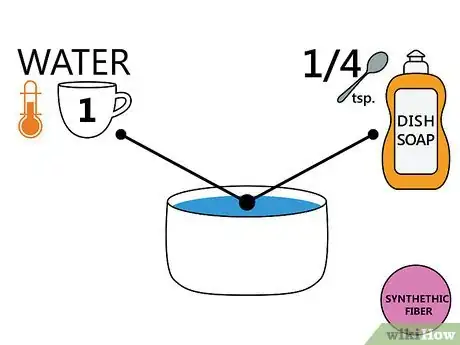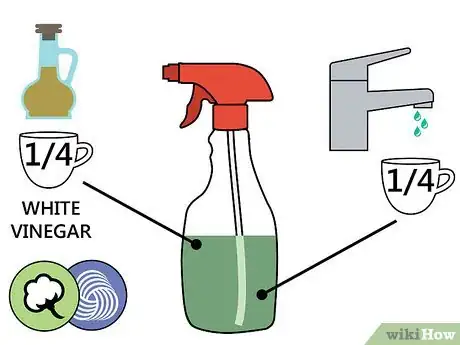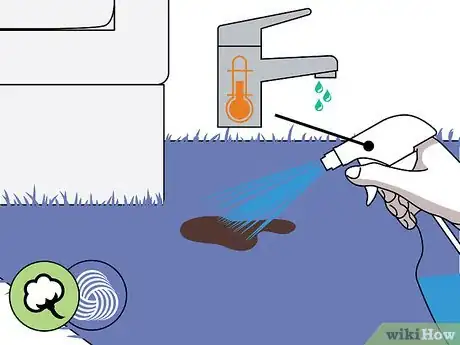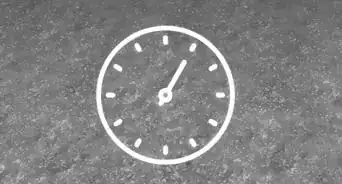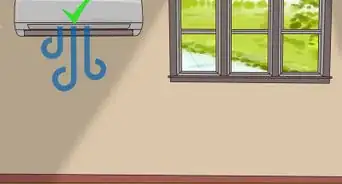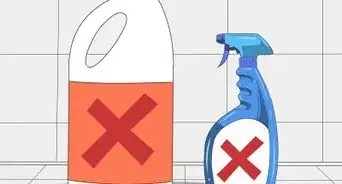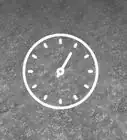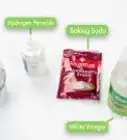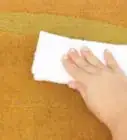This article was co-authored by Michelle Driscoll, MPH. Michelle Driscoll is the Owner of Mulberry Maids, which is based in Fort Collins, Colorado. With five years of experience, her business specializes in cleaning homes and small offices. She holds a Masters in Public Health from the Colorado School of Public Health. Additionally, Mulberry Maids has an A+ rating from the Better Business Bureau.
This article has been viewed 198,641 times.
Are you familiar with that sinking feeling when you find a lump of chocolate pressed into the carpet? Don't worry! White, dark, and milk chocolate can be removed quite quickly from synthetic and natural fiber rugs using household products like detergent and carpet shampoo.
Steps
Prepping for Stain Removal
-
1Act quickly. Take action as soon as possible after the chocolate has been rubbed into the carpet. As with most stains, the longer you leave it, the tougher it will be to remove.
-
2Remove excess chocolate. You can use a paper towel to blot excess chocolate, or scrape it gently with a dull knife.[1]
- If you choose to use a knife, place the removed chocolate onto a paper towel. Wipe the knife frequently to avoid smearing or grinding in the chocolate.
- If the chocolate is soft, chill it with an ice cube or frozen package to make it easier to chip out with the knife.
Advertisement -
3Check the carpet type. Different carpets react to stain removal techniques in different ways. Using the wrong removal method could cause the stain to become permanent or leave a worse mark than the stain itself.
- Determine if your carpet is made of natural or synthetic fiber, as this will affect the types of liquid cleaners that are safe to use.
- If you're in any doubt about your carpet's suitability, contact a professional carpet cleaner.
-
4Do a patch test. Before trying out any cleaning solutions, test a small amount on a patch of carpet. Wait 20 minutes to ensure the product will not damage your carpet. If your carpet starts to turn brown or lighter in color, immediately rinse the solution with cold water. Stop and call a professional.
-
5Put on a pair of rubber gloves. These will protect your hands from the chemicals in the cleaning solutions. You may also want to put on an old t-shirt just in case any other cleaning solutions splashes onto your clothing.
Cleaning a Synthetic Fiber Carpet with Detergent
-
1Make a detergent solution. Combine 0.25 tsp (1.2 mL) translucent liquid dishwashing detergent, like Joy or Dawn, with 8 fl oz (240 mL) of lukewarm water.[2]
-
2Apply the detergent solution. Dip a white cloth or paper towel into the detergent solution and blot the stain. Then, press the cloth or paper towel into the stain for several seconds. Wait for 15 minutes as the detergent dissolves the stain, then use a clean, dry white cloth or paper towel to remove excess liquid.[3]
- Remember to perform a patch test before applying the detergent.
- You may need to repeat this application a few times for it to be effective.
-
3Follow up with a vinegar solution. To make a vinegar solution, combine 8 fl oz (240 mL) of white vinegar with 16 fl oz (470 mL) of water. Dip a white cloth or paper towel into the vinegar solution and blot the stain. Then, press the cloth or paper towel into the stain for several seconds. Wait for 15 minutes, then blot the area with lukewarm water to rinse. Allow the area to dry.
- This step is important in removing residual detergent from your carpet. That way, dirt won’t stick to the treated area.[4]
-
4Use a heavy object to treat particularly bad stains. If the stain is especially bad, you might need to apply extra pressure during the drying process. Cover the stain with a 0.5 in (1.3 cm) thick stack of white paper towels or a couple of clean, white rags and a place a heavy object, such as a glass baking dish, on top. Let it sit for 15 minutes.[5]
- If the weight is coloured or porous, put a plastic bag between it and the paper towel. This will protect the weight and prevent dye from leaking into the carpet.
-
5Rinse the area. Using a damp paper towel or cloth, moisten the spot and blot. Allow the area to dry.[6]
-
6Apply 3% hydrogen peroxide if the stain persists. Detergent may not completely remove the stain. If this is the case, dampen the spot with 3% hydrogen peroxide and allow it to sit for 1 hour, then blot. Repeat this process until the stain is removed. Then, cover the stain with kitchen towel and a heavy object and allow the area to dry again.[7]
- If you cannot remove the stain, try the next method or consider calling a carpet cleaning company.
- Keep in mind that hydrogen peroxide can have a bleaching effect on carpets, so make sure to do a spot test on an inconspicuous part of the carpet before you do this. Wait 20 minutes after applying hydrogen peroxide to see the full effects.
Cleaning a Synthetic Fiber Carpet with Carpet Shampoo
-
1Blot the stain with cool water. Dampen a sponge with cool water and gently blot the stain several times.[8]
-
2Make and apply a diluted carpet shampoo solution. To make your carpet shampoo solution, mix 1 part liquid carpet shampoo with 4 parts water. Apply the solution to the stain with a brush or a towel.[9]
- Again, remember to do a quick patch test to ensure the solution won’t damage your rug.
-
3Vacuum. Allow the area to dry completely, then vacuum to remove the stain. If the stain persists, repeat steps 1-3.[10]
- If you cannot remove the stain, consider calling a carpet cleaning company.
Cleaning a Natural Fiber Carpet with Detergent
-
1Make and apply a detergent solution. Combine 1 tsp (4.9 mL) translucent liquid dishwashing detergent with one cup of lukewarm water. Spray the solution on the stain with spray bottle and blot with a white paper towel or cloth.[11]
-
2Follow up with ammonia solution. Combine one tablespoon of clear, white ammonia with 4 fl oz (120 mL) of lukewarm water. Spray the solution on the stain and blot with a white paper towel or cloth.[12]
- Before starting, make sure that the room is well ventilated, so that you don't breathe in too much ammonia.
-
3Follow up with vinegar solution. Make a vinegar solution by combining 2 fl oz (59 mL) of white vinegar with 2 fl oz (59 mL) of water. Spray the solution on the stain and blot with a dry, white paper towel or cloth.[13]
-
4Re-apply the detergent solution. Spray the solution on the stain and blot with a dry, white paper towel or cloth.[14]
-
5Rinse the area. Spray lukewarm water on the stain and blot with a dry, white paper towel or cloth.[15]
-
6Repeat. Continue steps 1-4 until the stain has disappeared.
Expert Q&A
Did you know you can get expert answers for this article?
Unlock expert answers by supporting wikiHow
-
QuestionWhat is the best way to clean my white carpet?
 Michelle Driscoll, MPHMichelle Driscoll is the Owner of Mulberry Maids, which is based in Fort Collins, Colorado. With five years of experience, her business specializes in cleaning homes and small offices. She holds a Masters in Public Health from the Colorado School of Public Health. Additionally, Mulberry Maids has an A+ rating from the Better Business Bureau.
Michelle Driscoll, MPHMichelle Driscoll is the Owner of Mulberry Maids, which is based in Fort Collins, Colorado. With five years of experience, her business specializes in cleaning homes and small offices. She holds a Masters in Public Health from the Colorado School of Public Health. Additionally, Mulberry Maids has an A+ rating from the Better Business Bureau.
Founder, Mulberry Maids
Warnings
- Wear protective clothing when cleaning.⧼thumbs_response⧽
- Take care with carpet cleaning products. There are many good carpet cleaning products on the market, but they're not stain specific and may include ingredients which are not applicable to your stain and could do more harm than good. If you do intend to use them, read the instructions and ingredients with great care. If you are unsure, consult a professional.⧼thumbs_response⧽
Things You'll Need
- Translucent liquid detergent
- Household ammonia
- 1 sponge
- Clear household vinegar
- Water
- 1 blunt knife
- 1 teaspoon
- 1 tablespoon
- 1 spray bottle
- 1 pair of protective gloves
- Several white cloths or paper towels
- A heavy weight, like a baking dish or book
- A clear or white plastic bag
- Liquid carpet shampoo
- A vacuum
- 3% hydrogen peroxide
References
- ↑ http://web.extension.illinois.edu/stain/staindetail.cfm?ID=79
- ↑ https://www.realsimple.com/home-organizing/cleaning/cleaning-stain-removal/easy-carpet-stain-solutions
- ↑ https://www.realsimple.com/home-organizing/cleaning/cleaning-stain-removal/carpet-stain-solutions/food-drink-0
- ↑ https://www.realsimple.com/home-organizing/cleaning/cleaning-stain-removal/easy-carpet-stain-solutions
- ↑ https://www.realsimple.com/home-organizing/cleaning/cleaning-stain-removal/carpet-stain-solutions/food-drink-0
- ↑ https://www.realsimple.com/home-organizing/cleaning/cleaning-stain-removal/carpet-stain-solutions/food-drink-0
- ↑ http://web.extension.illinois.edu/stain/staindetail.cfm?ID=79
- ↑ http://web.extension.illinois.edu/stain/staindetail.cfm?ID=79
- ↑ http://web.extension.illinois.edu/stain/staindetail.cfm?ID=79
- ↑ http://web.extension.illinois.edu/stain/staindetail.cfm?ID=79
- ↑ https://www.realsimple.com/home-organizing/cleaning/cleaning-stain-removal/carpet-stain-solutions/food-drink-0
- ↑ https://www.realsimple.com/home-organizing/cleaning/cleaning-stain-removal/carpet-stain-solutions/food-drink-0
- ↑ https://www.realsimple.com/home-organizing/cleaning/cleaning-stain-removal/carpet-stain-solutions/food-drink-0
- ↑ https://www.realsimple.com/home-organizing/cleaning/cleaning-stain-removal/carpet-stain-solutions/food-drink-0
- ↑ https://www.realsimple.com/home-organizing/cleaning/cleaning-stain-removal/carpet-stain-solutions/food-drink-0





